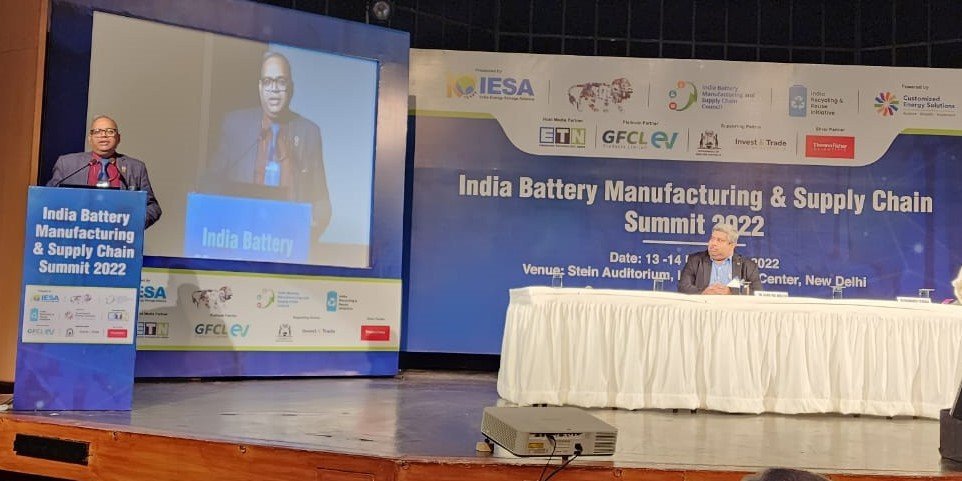"Our vision is very clear. We want India to be a global manufacturer and supplier of batteries adhering to the best of quality and energy efficiency parameters. We want to create a market scenario in which there is a considerable demand for 'Made-in-India' batteries from global markets", said Sudhendu Sinha, Adviser (Infrastructure Connectivity – Transport and Electric Mobility), NITI Aayog.
At the Day 2 of India Battery Manufacturing and Supply Chain Summit 2022 (IBSCS) held in New Delhi, India's positioning and prospects in the emerging battery industry and its related supply chain was discussed. India Energy Storage Alliance (IESA), the organizer of the summit, laid the context for the dialogue by launching its updated vision for the country's battery industry to achieve by 2035.
Inflating its earlier target figures of ACC battery manufacturing capacity in India brought out last year, IESA declared its revised projections, by which the country expects to build 35 GWh capacity by 2025, 140 GWh by 2030, and 550 GWh by 2035.
In his opening remarks, Dr. Rahul Walawalkar, President – IESA, said that India is yet to catch up with the growth of battery manufacturing and supply chain ecosystem at the international level, as its current share is minuscule. "With ACC PLI and various other initiatives to boost cell level manufacturing in India, we are creating a huge momentum. As a latest development, the diversification of supply chain as one of the lead focus of India's leadership at the G20 poses humongous opportunities for Indian players at the global level", he opined.
Dr. Walawalkar presented a larger picture of global giga factory landscape at present, with the United States emerging as a major manufacturing hub overtaking the growth of Europe apart from China. He spoke on the multiplier effect of the US Inflation Reduction Act (IRA) on battery ecosystem investments, and the wider scope for new players like India to shine in the battery supply chain.
"There is a significant shortage of manufacturing equipment for processing of battery materials and cell production. This is one example of immense opportunities available at the global level that India can leverage. Apart from manufacturing, India also has strong chemical processing industry, which can support battery materials processing", he said.
Corroborating with Dr. Rahul Walawalkar's projections, Sudhendu Sinha, Adviser to NITI Aayog, said that the India has clearly set its vision to emerge as one of the leading player in the global battery industry, and is moving in the right direction with pro-active policy support. "We want India to be know for its battery energy storage products with best-in-class quality and energy efficiency parameters, thereby setting new manufacturing standards. With top-end quality, we can create demand for 'Made-in-India' batteries at the global level", he added.
Touching upon the supply chain constraints resulting in shortage of critical battery materials, Sinha said that the Union government is very much aware of the emerging situation at the global level, and is taking various measures to ease out the challenges. "Recently, we at NITI Aayog hold a meeting with stakeholders from Western Australia and India on enhancing cooperation in this regard, not just in diplomatic channels but also through individual (corporate) relations".
"Further, the focus is on LATAM countries for sourcing of raw materials. MEA is very aggressive in this regard, and is taking steps to helping the concerns of Indian buyers at different countries. We want more industry based collaborations that are stable and long-term, not just governments based tie-ups", he noted.
Sinha opined that IESA can act as a strong platform to connect people and opportunities in the sourcing of raw materials. "In this one year since first edition of IBSCS, the way IESA has consolidated the battery supply chain industry is amazing. Supply chain efforts have to grow faster than manufacturing. We need renewed thrust on raw materials, processes, and equipment from the industry itself. That way, we want industry alliance like IESA to succeed, only then the country will move forward", he said.
He also expressed awe that IESA's membership has grown five-fold in recent years, and the alliance becoming the lead of the emerging traction in the spectrum of energy storage manufacturing in India. Sinha encouraged the industry grouping to come up with proposals for any fiscal or non-fiscal assistance with clarity and logic, so as to make policy makers understand their multiplier effect on the industry and nation's growth at the larger level.
Asked on the efficacy of setting battery manufacturing capacity targets for India based on global projections without clarity on domestic demand, Sudhendu Sinha replied that there is a fair understand of India's local battery demand in the coming decades. "The requirements for energy storage are likely to be high for Indian market as well, as the demand is expected not just from the mobility stream but also fairly in stationary storage applications".
RELATED: IESA organizes 2nd edition of India Battery Manufacturing and Supply Chain Summit 2022
Read More

